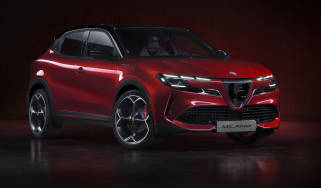Eco technology: The future's green...
Bentley's engineering chief on which ‘eco-friendly’ technologies will really work
The Bentley stand at Geneva wouldn’t seem the most obvious place to get a balanced view on the subject of CO2 emissions, until you learn that Dr Ulrich Eichhorn, the company's head of engineering, is actually one of the world’s leading authorities on the matter. During his time at VW he even helped create the infamous Lupo 3L, the ill-fated diesel lightweight boasting a CO2 figure that, at just 88g/km, was far lower than today’s Toyota Prius hybrid.
'Developing that car was interesting, but it unfortunately ended up being a sales disaster,' Dr Eichhorn explains. 'There’s an old saying that you can lead a horse to water but you can’t make it drink, and that’s what happened with the Lupo 3L – people weren’t interested in buying it. Maybe we launched it too early and the market wasn’t ready.'
However, despite his experience with super-frugal cars, Dr Eichhorn is quick to make it clear that it's business as usual at Crewe. 'If all Bentleys produced were grounded for one year then global CO2 emissions would only reduce by 0.000002 per cent that year, so we are hardly causing a problem anyway,' he points out. 'To have any real benefit it is the VW Golf sector that needs to change, as that’s where the volume lies.'
We asked Dr Eichhorn to assess current CO2-reducing technologies and score them out of ten.
1) Hybrids: 2/10'Hybrids are good at reducing CO2 emissions in stop-start driving conditions, but they lose all their advantages once you drive away from the city. You are then carrying a lot of extra weight – batteries, electric motors and so on – for no reason, making the car less economical than a non-hybrid. Plus there is plenty of extra technology on the car to go wrong. I see them as a stopgap technology, not a solution.'
2) Hydrogen: 0/10'Making the hydrogen fuel is so energy-hungry in the first place that the fact the hydrogen-powered car has zero CO2 emissions is immaterial. There are also major distribution hurdles to overcome, so I see hydrogen as being of very limited importance. The only thing that might save it is if we produce the hydrogen as a by-product of nuclear power, then I would give it a score of 3/10.'
3) Petrol: 2/10'If you burn one litre of petrol you produce two and a half kilos of CO2. This is a fact. We can make cars more economical, but current legislation has forced us to make cars heavier, so although engineers have made significant advances in fuel economy this has been nullified.'
4) Diesel 3/10'Slightly higher score than petrol as diesel cars are inherently more economical.'
5) Bioethanol: 2/10 (2nd generation: 9/10)'This technology has the biggest potential. At the moment bioethanol production is in its infancy in Europe, but second-generation production will revolutionise efficiencies. This is where the whole crop is harvested rather than just the grain from wheat, for example. This could lead to 5000 litres of bioethanol per hectare being produced rather than the 600 litres per hectare produced today.
'This new technology is moving out of the lab and into the field-trial stage at the moment. I see this being commercially viable in around four years' time. The great thing is we can use the current distribution infrastructure for the fuel and it keeps our engine technology the same. The other great advantage is you get "designer fuel". As you are making fuel from its component parts – carbon, hydrogen and oxygen – you can create the perfect fuel without the impurities you get with fossil fuels.'
6) Electric cars: 1/10(but potentially 9/10)'Just like hydrogen cars, it's the way the electricity is produced that is the problem, and the present battery technology is very heavy and gives limited range. If battery technology improves dramatically and the electricity is sourced solely from renewable sources, then I would score it 9/10. Then it could offer the best solution in city driving, but it’ll never be the solution for long distances.'
Finally, we ask Dr Eichhorn what we'll be driving in 50 years' time. 'It will be something we still recognise as a car,' he says, 'but powered by a highly advanced internal combustion engine running on renewable bioethanol. That's my hope anyway.'



